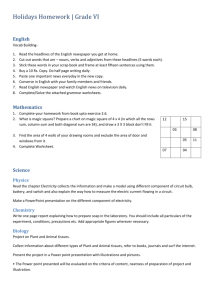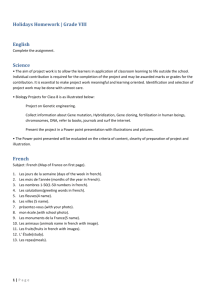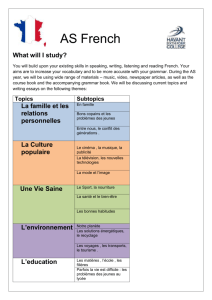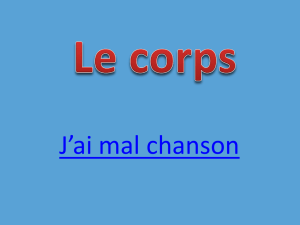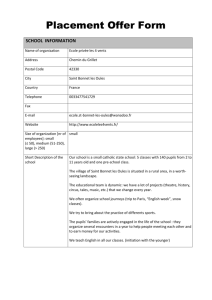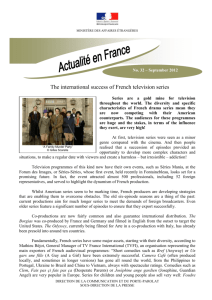AP FRENCH LANGUAGE
advertisement
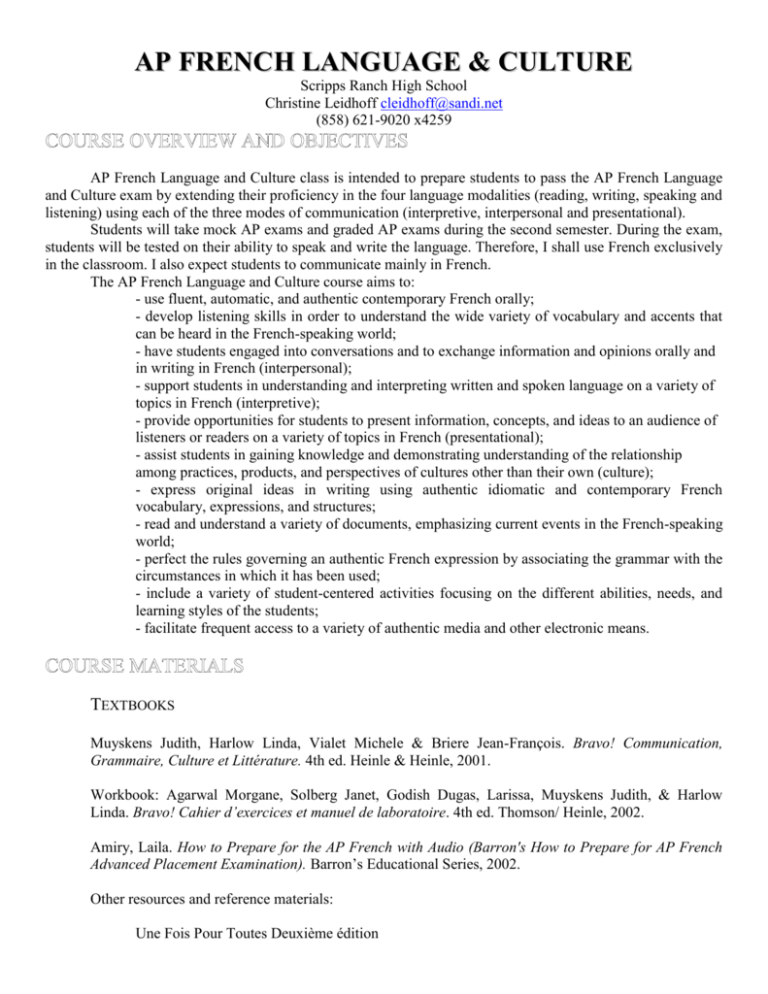
AP FRENCH LANGUAGE & CULTURE Scripps Ranch High School Christine Leidhoff cleidhoff@sandi.net (858) 621-9020 x4259 AP French Language and Culture class is intended to prepare students to pass the AP French Language and Culture exam by extending their proficiency in the four language modalities (reading, writing, speaking and listening) using each of the three modes of communication (interpretive, interpersonal and presentational). Students will take mock AP exams and graded AP exams during the second semester. During the exam, students will be tested on their ability to speak and write the language. Therefore, I shall use French exclusively in the classroom. I also expect students to communicate mainly in French. The AP French Language and Culture course aims to: - use fluent, automatic, and authentic contemporary French orally; - develop listening skills in order to understand the wide variety of vocabulary and accents that can be heard in the French-speaking world; - have students engaged into conversations and to exchange information and opinions orally and in writing in French (interpersonal); - support students in understanding and interpreting written and spoken language on a variety of topics in French (interpretive); - provide opportunities for students to present information, concepts, and ideas to an audience of listeners or readers on a variety of topics in French (presentational); - assist students in gaining knowledge and demonstrating understanding of the relationship among practices, products, and perspectives of cultures other than their own (culture); - express original ideas in writing using authentic idiomatic and contemporary French vocabulary, expressions, and structures; - read and understand a variety of documents, emphasizing current events in the French-speaking world; - perfect the rules governing an authentic French expression by associating the grammar with the circumstances in which it has been used; - include a variety of student-centered activities focusing on the different abilities, needs, and learning styles of the students; - facilitate frequent access to a variety of authentic media and other electronic means. TEXTBOOKS Muyskens Judith, Harlow Linda, Vialet Michele & Briere Jean-François. Bravo! Communication, Grammaire, Culture et Littérature. 4th ed. Heinle & Heinle, 2001. Workbook: Agarwal Morgane, Solberg Janet, Godish Dugas, Larissa, Muyskens Judith, & Harlow Linda. Bravo! Cahier d’exercices et manuel de laboratoire. 4th ed. Thomson/ Heinle, 2002. Amiry, Laila. How to Prepare for the AP French with Audio (Barron's How to Prepare for AP French Advanced Placement Examination). Barron’s Educational Series, 2002. Other resources and reference materials: Une Fois Pour Toutes Deuxième édition Trésors du temps, Glencoe 2005 Moments Littéraires Imaginez, Vista Panaché Littéraires with audio Collection Littéraire Lagarde et Michard En bonne forme, 7th édition, Houghton Miflin 2001 Released AP French Language Exams LITERATURE Le Petit Prince, Saint-Exupery La Rue Case-Nègres, Zobel La Gloire de mon père, Pagnol L’enfant noir, Laye L’homme qui plantait des arbres, Giono Selected fables, La Fontaine La Génie du mangier Candide, Voltaire WEB SITES A LCD projector with speakers in the classroom and the school computer lab give the opportunity to my students to be able to do other activities using authentic web sites. Grammaire and Vocabulaire: Le point du FLE www.lepointdufle.net Tex’s French grammar http://www.laits.utexas.edu/tex/index.html Bonjour de France http://www.bonjourdefrance.com/bonjour.htm www.bbc.co.uk/languages/french http://www.sunderlandschools.org/mflsunderland/resources%20pr%20fr.htm http://www.referentiel-fle.be/ http://web.mac.com/maryamdam/iweb/Site%20Map/Site%20Map.html TV, newspapers & podcasts: Tf1 www.tf1.fr France 2 www.france2.fr Canal plus www.cplus.fr TV5 www.TV5.org www.lemonde.fr ITunes podcasts Chansons and other listening activities : www.paroles.net http://french.yabla.com/ Littérature : http://www2.ignatius.edu/faculty/turner/apfrlit.htm http://pages.infinit.net/cltr/littfr.html#cfl http://poesie.webnet.fr/ http://clicnet.swarthmore.edu/litterature/litterature.html THEME & GRADING PERIODS La famille et la communauté September/ October (5-6 weeks) La vie contemporai ne October/ November (5-6 weeks) La quête de soi December/ January (5-6 weeks) RECOMMENDED CONTEXTS ESSENTIAL QUESTIONS STRUCTURE LITERATU RE Le petit Prince Excerpt of La Rue CasesNègres MOVIES (CM= court métrage) J’attend rai le suivant (CM) Le ballon prisonni er (CM) Amélie La Boum 1 +2 Les rapports sociaux L’enfance et l’adolescence La citoyenneté Les coutumes La famille L’amitié et l’amour What constitutes a family in different societies? How do individuals contribute to the wellbeing of communities? How do the roles that families and communities assume differ in societies around the world? La publicité et le marketing L’éducation et l’enseignement Les fêtes Le logement Les loisirs et le sport Le monde du travail Les rites de passage Les voyages How do societies and individuals define quality of life? How is contemporary life included by cultural products, practices and perspectives? What are the challenges of contemporary life? How are aspects of identity expressed in various situations? How do language and culture influence identity? How does one’s identity develop over time? Reflexive verbs Adjectives Adverbs Preposition La Gloire de mon père Le placard L’étudia nte Passé composé Imparfait Plus-queparfait L’enfant noir La Génie du mangier De l’autre côté (CM) Entre les murs Madam e Brouett e L’aliénation et l’assimilation Les croyances et les systèmes de valeurs Les sexes et la sexualité La langue et l’identité Le pluriculturalism e Le nationalisme et le patriotisme Present Imperatif Questions Négation Present participle MUSIC Marseille de Patrick Fiori Viens à SaintGermain de Dany Brillant Comme d’habitude de Claude François (present tense) Lève-Toi et Rap de MC Solaar (impératif) Je suis un homme de Zazie (présentt) Cash City de Luc de la Rochelière (negation) Le banc des délaissés de Boulay (present) Dessine-moi un mouton Oxygène de Dion J’adore de Couxor Chômage de Zebda Armand est mort de MC Solaar Ma France à moi de Diam’s Jeune de banlieue de La Peste Je suis blanc de Kamini Je suis né de Doc Gynéco (PC) Il avait les mots de Luna (Imparfait) Hier encore d’Aznavour (PC/ imparfait) J’avais rêvé d’une autre vie (plus-que parfait) THEME & GRADING PERIODS La science et la technologie January/ February (56 weeks) Les défis mondiaux February/ March (5-6 weeks) L’esthétique April/ May (5-6 weeks) RECOMMENDED CONTEXTS ESSENTIAL QUESTIONS STRUCTURE LITERATU RE La recherche et ses nouvelles frontières Les découvertes et les inventions Les choix moraux L’avenir de la technologie La propriété intellectuelle Les nouveaux moyens de communication La technologie et ses effets sur la société How do developments in science and technology affect our lives? What factors have driven innovation and discovery in the fields of science and technology? What role do ethics play in scientific advancement Futur Conditionel Si clauses Articles: Tous égaux face au web La Tribu des Yetties La tolérance L’économie L’environneme nt La santé Les droits de l’être humain L’alimentation La paix et la guerre What environmenta l, political and social issues pose challenges to societies throughout the world? What are the origins of those issues? What are possible solutions to those challenges? Subjonctif Pronouns Relative pronouns L’homm e qui plantait des arbres Selected fables from La Fontaine Comme nt j’ai marché sur la lune (CM) L’hom me qui plantait des arbres (CM) Au revoir les enfants How are perceptions of beauty and creativity established? How do ideals of beauty and aesthetics daily life? How do the arts both challenge and reflect cultural perspectives? Review of all verb tenses and structures Tintin: Le secret de la Licorne La Belle et la bête L’architecture Le patrimoine Le beau Les arts littéraires La musique Les arts du spectacle Les arts visuels MOVIES (CM= court métrage) MarieCurie Docume ntaries on aids in Africa MUSIC Rien que pour toi de Feldman (future) Mourir demain (conditional) Si tu veux de Palmas (future) Sit u n’étais pas là de Luna (conditional) Jeune Demoiselle (future) Tu vas me détruire (close future) Si je devais mourir demain de St Pierre (conditionel) Je chanterai de Dion (future) Né en 17 à Leidenstadt (si) Si j’avais un marteau (si) Faudel Le pont Mirabeau (subjonctive) Sexy pour moi (subjunctive) À ta place de Zazie et Bauer (subjunctive) Quelqu’un que j’aime de Dion (relative pronouns) Clic Clac Oh c’est beau de Dimey Où veux-tu que j’aille de Fakoly Cendrillon de Telephone (mixed tenses) J’irai où tu iras de Dion & Goldman (mixed) This section presents the array of instructional and teaching strategies used in order to support students in extending their proficiency in the four language modalities (reading, writing, speaking and listening) using each of the three modes of communication (interpretive, interpersonal and presentational). WRITING Students receive instruction on how to write a well-organized analytical or persuasive essay, which will include strategies for brainstorming, organization, using of transition words. Students write an AP format persuasive essay about every 2-3 weeks with a time limit of 50 minutes (class period). Students are graded according to the AP test grading system. Students receive feedback from their peers and/or their teacher for each essay they write. Using this feedback and other references, students will rewrite their essay by making corrections on vocabulary and grammar and by improving the content as needed. Students write and present their own fable after analyzing a selection of fables written by La Fontaine. Students create a children’s short story book and read it to other students. Students respond to emails and/or blogs written by their teachers and/or their pen pals located in France (teacher has students correspond to students with a French high school). Emails and blogs may be graded according to the AP test grading system. o Teacher may provide students with a topic or theme (as listed in the course planner) they need to discuss in their emails/blogs o Teacher encourages students to compare and contrast their lives in the US to the lives of their pen pals in France using graphic organizer and/or well-organized essay. SPEAKING Students are engaged in conversations similar to the AP test format. Students are graded according to the AP test grading system. Students are assigned projects on the themes listed in the course planner and students present their projects to their classmates. Students participate in debates and have to explain their opinions with concrete examples or facts. Students prepare for debates by researching and reading materials related to topic. Students discuss topics and themes presented in their readings (see literature listed in course planner). Students discuss similarities and differences between texts and movies (if available). Students perform a play of their choice in a small group setting. Students analyze and discuss how a character in a story relates to them. Students participate in unrehearsed role-plays on a variety of themes studied. Students interpret the meaning and/or the intent of the artist while analyzing a picture or an art piece. READING Students read authentic texts. o Students analyze and discuss the reading o Students respond to multiple-choice questions o Students compare and contrast themselves to the characters o Students compare and contrast their lives to the lives of the characters o Students summarize what they read o Students predict events Students read a variety of Francophone excerpts and short stories. Students read authentic news, magazines and online articles in order to widen their cultural awareness and to be exposed to materials related to the themes listed in the course planner. LISTENING Released AP French exams AP French listening practices from Barron’s and Ladd Music and video clip o Students listen to authentic music and/or watch music video clip o Students are exposed to a variety of accents and vocabulary repertoire o Students answer multiple choice questions o Students complete cloze activities o Students tell in their own words what the theme of the song is, what the message is or what the intent of the singer is Movies o Students watch authentic movies and short films o Students respond to multiple-choice questions o Students respond to short answers question type o Students compare and contrast the lives of the characters with their own o Students provide summaries of films Students engage in conversations with peers and teacher CULTURE Students are exposed to a variety of texts, audio and visual materials that present the products and practices of different Francophone countries Students access authentic materials through the use of the Internet Students compare and contrast their products and practices to those of the Francophone speakers and countries studied in class Students discuss the cultural and linguistic differences presented in their reading and/or movies. Students create their own French wedding: students learn about French traditions, French laws and regulations, religion and apply what they learn to the creation of the wedding. TECHNOLOGY Students research information on authentic websites Students participate in web quests created by teacher Students use emails and blogs to talk with teacher and students in France Students access online activities provided by teacher Students take virtual tours of museums and answer multiple choice questions and open-ended questions to express their views, beliefs and understandings. Students create power point presentations on a variety of topics assigned by teacher or chosen by students Students create an animated video on one of the Comic book characters Students create an advertisement for a product of their choice Grading policy: Student’s Grades are divided by five categories. Participation, written and listening, projects, Exams and quizzes. Weekly quizzes are usually on Fridays. All grades are updated on Zangle which can be viewed on PARENT CONNECT. If you have any questions on student grades, please contacted me at cleidhoff@sandi.net. Class rules regarding electronics, tardies, Honesty Policy truancies can be accessed in your Student Handbook page 28. Violation with any of these rules will be in compliance with school policy. Homework will vary and can be accessed daily on srhsfalcons.org website. Students have the right to learn and I have the right to teach. If a student is impeding the learning of others, immediate action will be taken and citizenship will be lowered after first warning.
